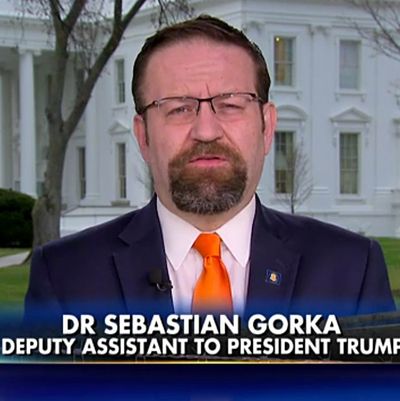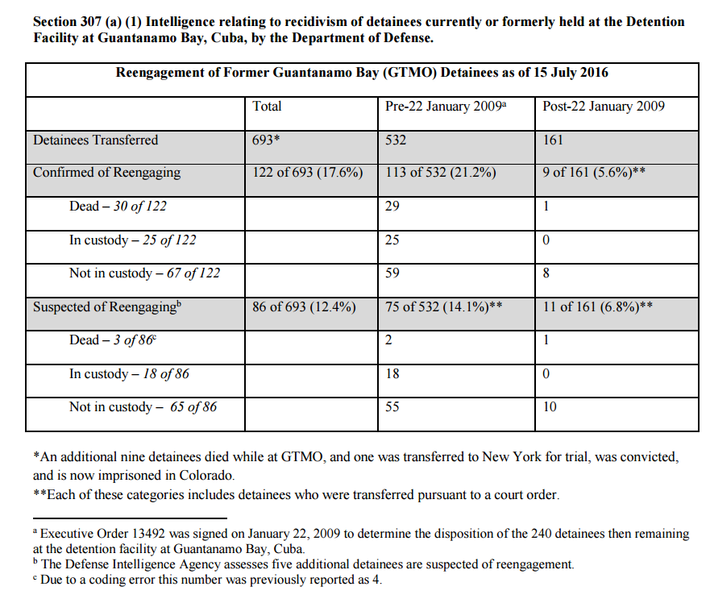
Until recently, Sebastian Gorka, a deputy assistant to President Trump and a self-proclaimed expert on radical Islam, wasn’t a well-known or respected figure in the national-security community. In fact, every profile of him — and there have been a bunch lately — quotes national-security wonks either saying they hadn’t heard of Gorka until he was appointed by Trump, or casting aspersions on his scholarship.
“When I first encountered his name during the transition, I did a triple-take,” Daniel Benjamin, counterterrorism coordinator for Hillary Clinton when she was secretary of State, told Politico. “I’ve been in counterterrorism since 1998, and I thought I knew everyone. But I’d never heard his name and couldn’t recall anything he’d written or said.” Cindy Storer, a former CIA analyst and radicalization expert, was more straightforward: “He thinks the government and intelligence agencies don’t know anything about radicalization, but the government knows a lot and thinks he’s nuts,” she told the Washington Post. As these and other articles have pointed out, Gorka, who has a Ph.D. in political science from his native Hungary (correction: his parents are from there, but Gorka was born in Britain), is a relative newcomer to counterterrorism, and simply hasn’t built up an impressive academic track record on the subject. (The fact that, per Politico, “[s]everal passages of [Gorka’s] 2007 dissertation” appear to be lifted verbatim from a Human Events article written by his wife, who works in the same field, doesn’t help matters.)
But Gorka, who prior to Trump’s inauguration crowed to Fox News that “the alpha males are back” in charge, isn’t in the White House because of his CV; rather, the available evidence suggests he’s there because of his hard-line beliefs. He is an ardent proponent of the “counter-jihad” ideology that permeates the Trump administration, and which is centered on Steve Bannon and Trump himself — the belief that America is locked in a global war with radical Islam that most people don’t take nearly seriously enough, and that both the EU and the U.S. are seriously threatened by the possible imposition of Sharia law by hordes of innocent-seeming Muslims. (Before he was ousted, former Trump national security adviser Michael Flynn was an enthusiastic proponent as well.) Gorka has helped spread these sorts of ideas both in his recently released book, Defeating Jihad: The Winnable War, and in his role as a Breitbart’s former national security editor and a TV talking head.
Like Gorka himself, this counter-jihad movement is not taken seriously by the mainstream national-security establishment. Members of that establishment acknowledge that radical Islamic terrorism is a problem, of course, but simply don’t see the epochal, black-and-white civilizational struggle folks like Gorka, or the counter-jihad movement’s de facto leader Frank Gaffney (who has advised Trump in the past), do. Nor do they fall in for some of the feverish conspiracy theorizing that persistently dogs the movement — Gaffney, for example, frequently spread the falsehood that former president Obama himself was a radical Muslim trying to help terror groups from within the White House. Rather, members of the national-security establishment understand that different Muslim-affiliated terror groups have different motivations — not all of them religious — and don’t see it as their role to overhype the reach and strategic strength of groups like ISIS or Al Qaeda, when those groups happen to be in decline. (While the mainstream natsec community is decidedly more reality-based than the counter-jihadists, that doesn’t mean it hasn’t also screwed up in spectacular ways over the years, of course.)
This gap between the excesses of counter-jihad and the more deliberate and rational approach taken by the mainstream natsec community is inevitably going to cause tensions within the Trump White House, simply because the two camps see the world so differently. Trump appointees like Jim Mattis and Flynn’s replacement, H.R. McMaster, do not believe we are locked in an existential struggle against a giant Muslim conspiracy; Gorka, Bannon, and Trump do.
The divide manifested itself in an interesting way yesterday morning on Fox & Friends. During the broadcast, Gorka, in the course of discussing a former Guantanamo Bay detainee who recently blew himself up in Iraq — and making the case for the expand-Guantanamo-don’t-close-it “toughness” that characterized Trump’s terror-talk during the campaign — offered some scary statistics about what might happen if more Gitmo detainees are released. “We know there’s at least 30 if not more than 40 percent recidivism rate from the people released at Gitmo,” Gorka said. “President Obama released lots and lots of people that were there for very good reason, and what happened? Almost half the time they returned to the battlefield.”
But according to the government’s own statistics — that is, statistics prepared by the sorts of wonks who tend to say mean things about Gorka — that’s just not true. Federal law requires the director of National Intelligence to release a public report at least every six months that tracks what has happened to released Gitmo detainees. Here’s a handy chart from the most recent one, published in July of last year:

The main thing that stands out is that the Obama years saw a much lower recidivism rate among former Gitmo prisoners than the Bush years. Since Obama was sworn in, the recidivism rate for released Gitmo inmates has been just 5.6 percent, or 12.4 percent if you count each and every “suspected” case of recidivism as a “confirmed” one as well. During the Bush years, those rates were 21.2 percent and 35.3 percent, respectively. According to Human Rights First, an advocacy group, this change is mostly attributable to the fact that the Obama administration instituted a more thorough vetting process than the George W. Bush administration had in place (though there could be other contributing factors as well, such as the reduced direct-combat role of the U.S. in Iraq and Afghanistan).
So it simply doesn’t make any sense for Gorka, in the course of criticizing the Obama administration, to claim the recidivism rate is between 30 and 40 percent — let alone “almost half.” During the Obama years, the recidivism rate was a fraction of that.
John Horgan, a psychology professor at Georgia State who is a leading researcher in the field of countering violent extremism, said that he viewed Gorka’s claims as emblematic of his broader disdain for mainstream national-security and CVE work. “The reality is he is someone who uses the credibility associated with having a PhD and associated with being an academic,” he told Intelligencer, “but at the same time wants to stand outside that and doesn’t want to be held to facts and figures and evidence, and you simply can’t have it both ways.” (Horgan, who doesn’t have an affiliation with Human Rights First, also said he thought the organization’s account about the difference between the Bush and Obama administrations’ Guantanamo Bay policies was accurate.) And the broader problem, Horgan said, is that the counter-jihad framing itself simply doesn’t lend itself well to the careful, rational and cost-benefit-analysis-laden work that is supposed to define this sort of policy making. “Bannon and Gorka and their colleagues have framed this as an existential threat that can’t be qualified, can’t be measured, can’t be thought about in terms of facts and figures and evidence,” he said. “And if we buy into that narrative then we have lost perspective.”
Of course, if Gorka’s ultimate goal is to promote the idea of an apocalyptic struggle between Islam and the West, it makes perfect sense that he would overstate the probability of recidivism among Guantanamo detainees. But this is just a Fox & Friends segment, relatively harmless in the grand scheme of things. What happens when it comes time to carefully evaluate a complicated pile of evidence and make a big decision about national-security policy or counterterrorism? Who will win, the Trump-Bannon-Gorka crowd, or Mattis, McMaster, and their allies in the traditional national-security establishment?





























